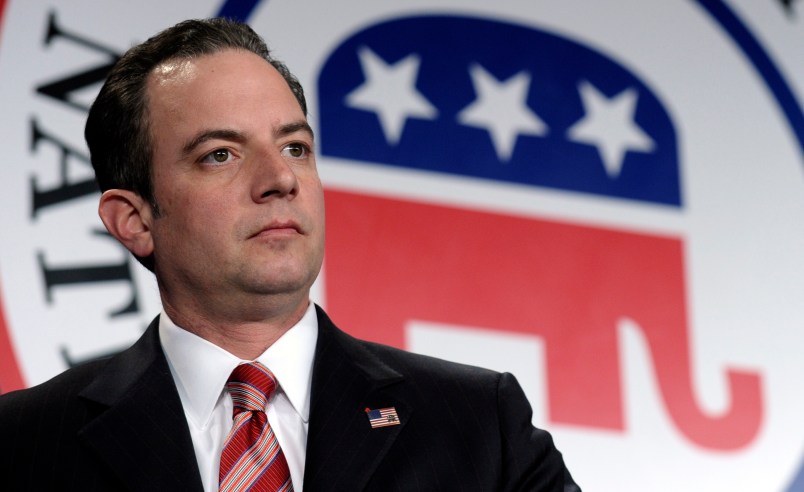One year after the GOP’s brutal post-election “autopsy” report, the party has shunned meaningful changes to its governing agenda and is instead relying on stylistic shifts to make itself relevant to the changing American electorate.
In a joint op-ed published Monday in RealClearPolitics.com, the authors of the Republican National Committee report, which was released one year ago today, emphasized and re-emphasized their recent efforts to expand voter outreach, adopt the latest technologies and craft a message that appeals to voters outside their core tent. They expounded on their successes in those areas in a conference call with reporters in the afternoon.
Conspicuously missing in both venues was a single policy change embraced by the congressional GOP in the wake of the RNC’s introspective look at where its party went astray.
That’s not because Republican operatives didn’t want policy changes. The 100-page report last year warned of electoral doom if the GOP didn’t, for instance, embrace comprehensive immigration reform.
“[A]mong the steps Republicans take in the Hispanic community and beyond we must embrace and champion comprehensive immigration reform. If we do not, our Party’s appeal will continue to shrink to its core constituencies only,” the report said. It elevated the threat level: “If Hispanic Americans perceive that a GOP nominee or candidate does not want them in the United States (i.e. self-deportation), they will not pay attention to our next sentence.”

The party responded with a resounding “meh.” While a group of Senate Republicans joined Democrats to pass an immigration overhaul in 2013, Senate GOP leaders voted against it every step of the way. And the majority House Republican leaders have signaled they won’t act on the issue after a backlash from their base. In fact, the only two immigration-related bills that the House GOP has brought up and passed since the 2012 election would effectively require Obama to deport people who were brought to the U.S. illegally as children.
Another issue that the RNC urged Republicans to shift on was gay rights, describing it as a “gateway” issue for young voters in particular.
“Already, there is a generational difference within the conservative movement about issues involving the treatment and the rights of gays,” the report read. “If our Party is not welcoming and inclusive, young people and increasingly other voters will continue to tune us out.”
The response? Nah. Republicans stuck to their guns against gay rights, first by spending some $3 million to defend the anti-gay Defense of Marriage Act — and losing in the Supreme Court. Then they reaffirmed their opposition to same-sex marriage in the official party platform. And House Speaker John Boehner nixed the Senate-passed Employment Non-Discrimination Act, which beefs up protections for LGBT individuals in the workplace. All this despite recent polling finding that a majority of young people in their own party support same-sex marriage.

More broadly, the autopsy report called on Republicans to be more “inclusive and welcoming” toward younger voters and many (read: unmarried) women. “When it comes to social issues, the Party must in fact and deed be inclusive and welcoming,” the authors pleaded. “If we are not, we will limit our ability to attract young people and others, including many women, who agree with us on some but not all issues.”
Other than finding new ways to sell their policies and holding workshops teaching candidates to talk to women, it’s hard to discern a GOP course change on the substance. Over the last year, for instance, House Republicans have passed a variety of bills aimed at restricting legal abortion and have pushed the Supreme Court to strike down Obamacare’s mandate for employers to cover birth control without co-pays in their insurance plans.
TPM checked in with the RNC on what policy recommendations congressional Republicans adopted from the report. RNC spokeswoman Kirsten Kukowski didn’t point to any, but told TPM in an email that immigration was a difficult problem, arguing that the authors of the report “weren’t prescriptive on what [reform] looks like” and that “leaders on the Hill have been working on and discussing immigration issues.” On gay rights, she pointed out that RNC Chair Reince Priebus has “discussed the need for a change in tone” over the last year.
On the conference call, RNC committeeman Henry Barbour downplayed the GOP’s stubbornness on immigration reform and touted the party’s voter outreach efforts.
“We are staffing people of color in various communities across the country to engage them and have conversations with them,” he said. “I think the RNC should be commended.”
A new RNC ad campaign reveals the extent to which the Republican party is relying on style shifts as opposed to a substantive rethinking of its policies. It features an Asian woman, a black woman, a Hispanic man and a white male hipster proudly declaring that they’re Republicans.
The GOP’s resistance to modernizing its agenda isn’t likely to harm the party in the 2014 congressional elections, where Republicans have a structural advantage due to an older, whiter and more male mid-term electorate. The GOP’s core tea party and evangelical constituencies — which represent its resistance to change — are likely to turn out. The 2016 election is where the party is shaping up to pay a steep price if it doesn’t overhaul its approach to governing.
“The best thing for the party is to focus on 2014 and 2016 will take care of itself,” said Barbour.






